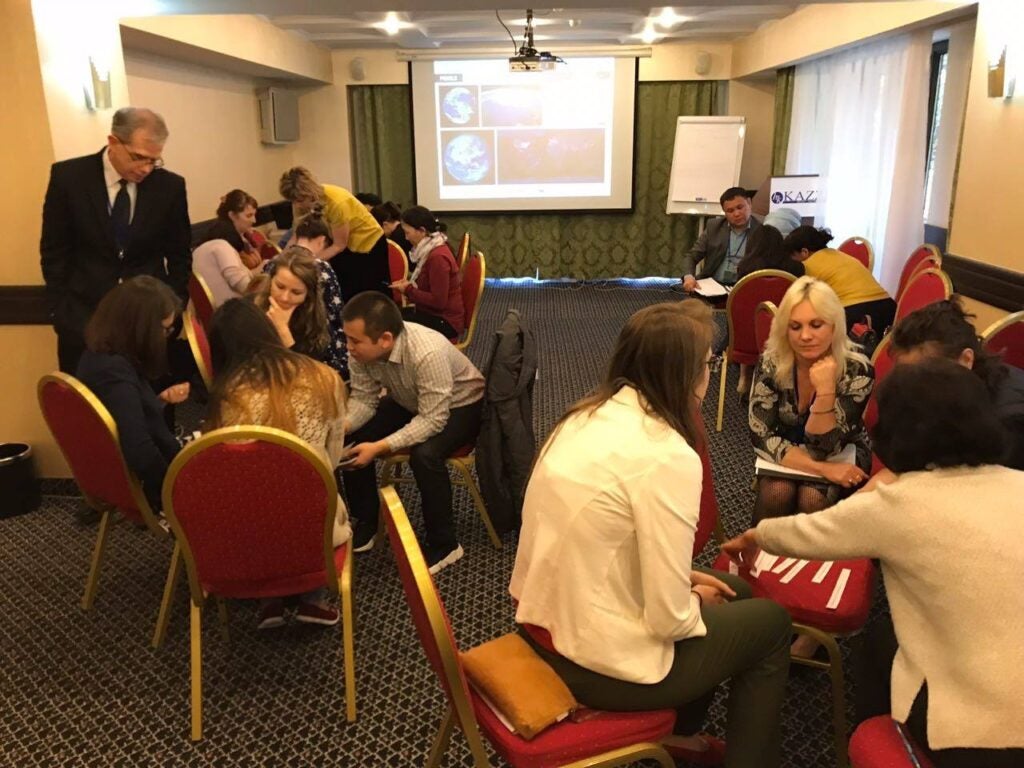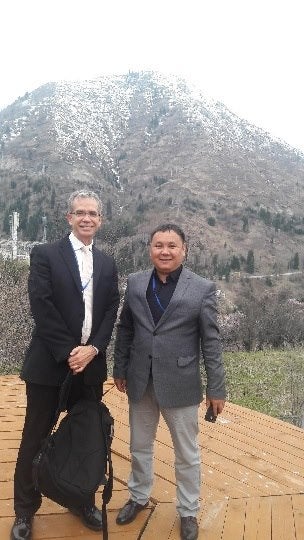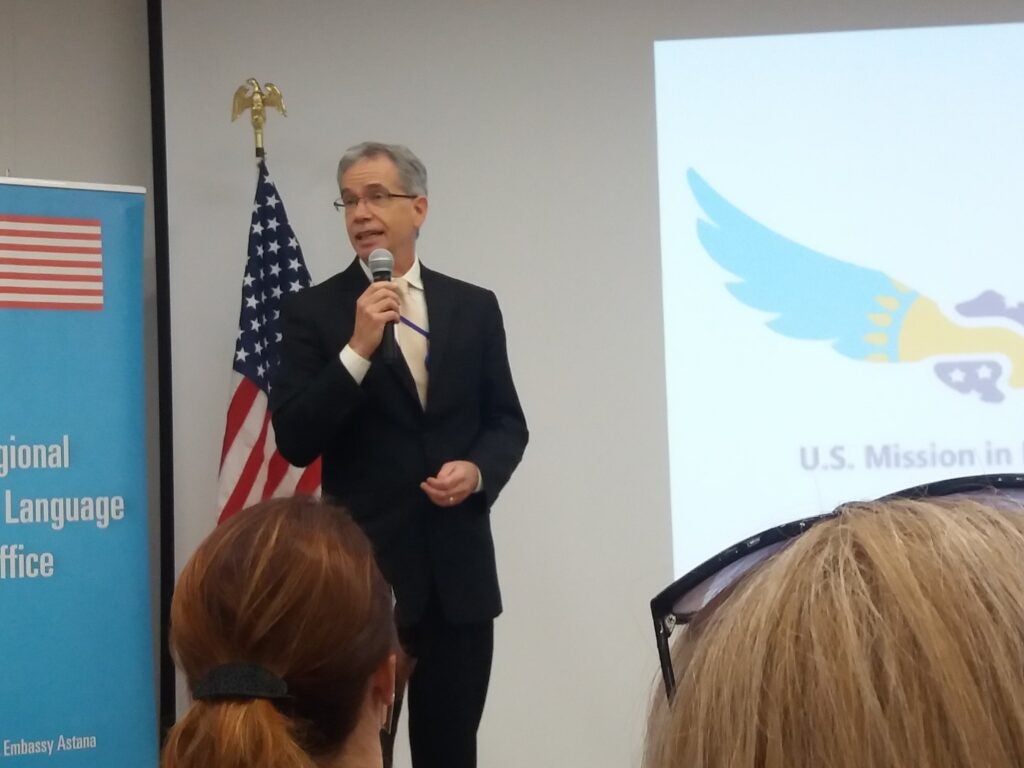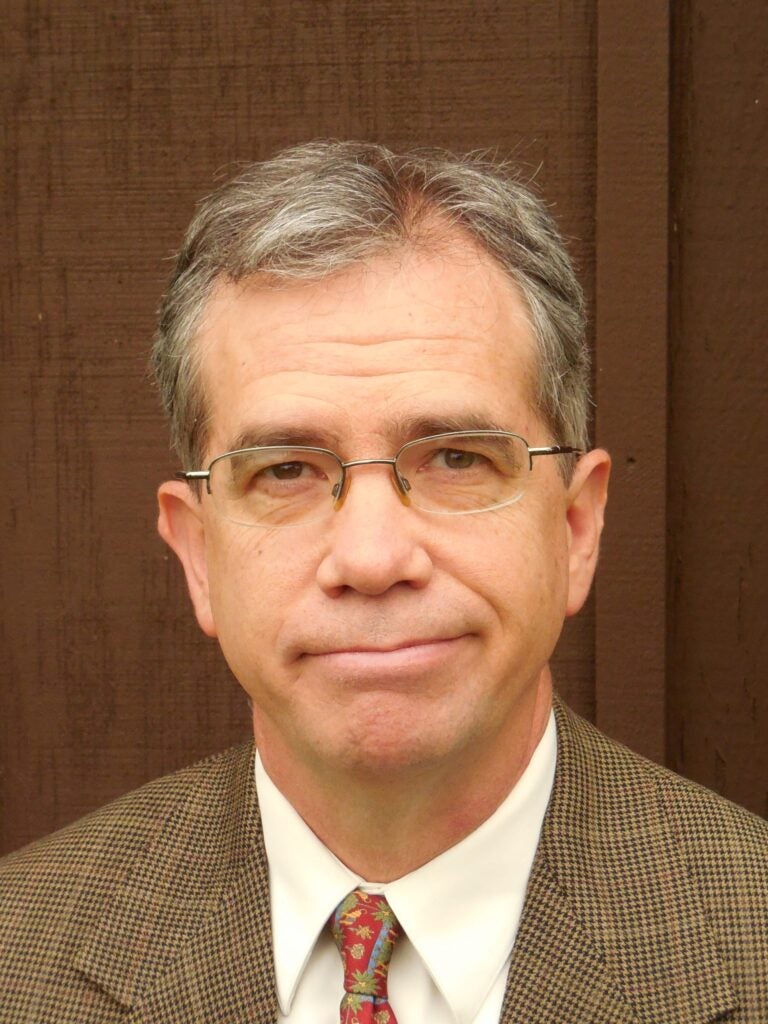“I wanted [the teachers] to understand that teaching English for STEM isn’t scary. The language is approachable, and the activities are not only manageable but also highly creative.”
Mark Dorr understands how daunting the prospect of teaching English for science, technology,
engineering, and mathematics (STEM) can be for non-native English speakers. In his many years as an
English Language Specialist, he has seen the anxiety that English-for-STEM trainings can create in
participants, with language instructors worrying about their lack of science training, and STEM teachers
fretting about their language pedagogy. As a result, when Dorr was assigned to conduct English-for-STEM
trainings in Kazakhstan in 2017, and Kazakhstan and Kyrgyzstan in 2018, he was well prepared to allay
participants’ concerns, particularly in Kyrgyzstan, where his trainings would be that country’s
introduction to the subject. “I wanted them to understand that teaching English for STEM isn’t scary,” he
says. “The language is approachable, and the activities are not only manageable but also highly creative.”
As it turns out, the participants’ apprehensions were quickly dispelled by Dorr’s inventive approach.

Since process is critical in STEM fields, Dorr wanted most importantly for participants in his trainings —
all secondary school through university educators — to become comfortable with the language of
process, focusing on such elements as verb tense and cause-and-effect words. And what better way to
investigate how to apply process language than by analyzing the intricate machines depicted in the
illustrations of Rube Goldberg, the cartoonist, inventor, and engineer famous for his elaborate
contraptions that perform simple tasks in convoluted ways? After explaining who Rube Goldberg was —
and why his name became an adjective — Dorr introduced participants to such Goldberg illustrations as
“Self-Operating Napkin,” “Simple Alarm Clock,” and “Putting the Cat Out At Night.” Next, in groups he
had them examine a Goldberg drawing — title removed — and describe what was happening. How did
the machine work? What steps did it take? And finally, what was its purpose? “The teachers thought the
devices were funny, but describing them — that was another matter,” he recalls. “It was a challenge.
They had to work through the process, reasoning it out. After all, these were not the normal objects of
everyday life.” Ultimately, the Goldberg illustrations were a hit. “Participants were amazed at how they
could see the process and turn it into language,” he says.

Dorr also wanted to connect process language directly to the cultures of Kazakhstan and Kyrgyzstan.
Toward that end, he researched popular folk stories in those countries and incorporated them into his
training sessions, a common practice for Dorr. “When these well-known tales are brought in, participants
immediately feel less intimidated by the language and more comfortable playing with it,” he notes. In
Kazakhstan, he had teachers consider a well-known Kazakh folk character, Aldar Kose, a wily and kind-hearted person who cheats the rich and helps the poor. In one popular tale, he cons a wealthy man out
of his fur coat in exchange for Kose’s threadbare but “magic coat.” Dorr asked training participants, again
using process language, to reframe the description of Kose’s coat, first, to more effectively handle the
problem in the story and, second, to make it useful for themselves. In Kyrgyzstan, Dorr had participants
work on a similar activity, applying the language of process to folk stories by Nasreddin, a 13th-century
Sufi satirist and philosopher whose humorous tales are well-known throughout the country.
“STEM is about exploring — again, that’s where process comes into play —
and sometimes there are several possible answers and sometimes things go wrong. I wanted them to develop the confidence to use the language and help their students do the same, so they can use it to explore.”
While process language is a vital component of STEM, so is group work. “Few things happen individually
in STEM,” says Dorr. “It’s all about collaboration. I wanted to change the mindset of participants, to get
them thinking out of their literal classroom rows and columns and into groups.” One of Dorr’s training
activities that artfully achieved that goal involved the popular television series “Friends.” Dorr had
participants watch a segment from “Friends” involving all of the show’s six main characters. After
viewing, he set up groups, assigning each group member to the role of one of the characters. They then
re-watched the segment, with each participant focusing exclusively on their character’s portion of
dialogue; groups then reconstructed the scene in character. Dorr also had participants change groups,
recreating the scene with a different mix of “actors.” Participants found this “a very powerful
communication activity,” he says. “They became aware of how to listen and interact in different ways.”

While Dorr’s English-for-STEM activities — others included examining the “drip technique” of Jackson
Pollock’s paintings and building simple catapults — were highly effective, he found that two aspects of
STEM stymied participants: the possibility for multiple right answers and for failure. “Finding the
language to explain why there might be more than one reason that a scientific process happens or how
a hypothesis could lead to a dead end was hard for them,” he recalls. Dorr worked to help the educators
become more comfortable with ambiguity and to reframe the concept of failure, not just for themselves
but also for their students. “STEM is about exploring — again, that’s where process comes into play —
and sometimes there are several possible answers and sometimes things go wrong. I wanted them to
develop the confidence to use the language and help their students do the same, so they can use it to
explore.”

Since 1996, Mark Dorr has completed multiple Specialist assignments in Albania, Guatemala, Kazakhstan, Kyrgyzstan, Pakistan, Saudi Arabia, and one in Syria that was cut short by the Iraq War.. Mark received a Fulbright award in teacher education in Pakistan, was a Senior English Language Fellow in Guatemala and Romania, and was a USIS ETTF and Assistant Professor in Poland. Mark’s areas of focus are TEFL teacher education, English for STEM/Diplomacy/Countering Human Trafficking/Law, and national curriculum design. Mark has taught at Colorado State University and was the Director of the Center for International Education at the University of Northern Colorado. Mark has written several books including English from Real Situations (Kirihara Shoten Tokyo, 1992). Additional interests include archeology, aviation, and wilderness skills instruction, but his best success is his family.
